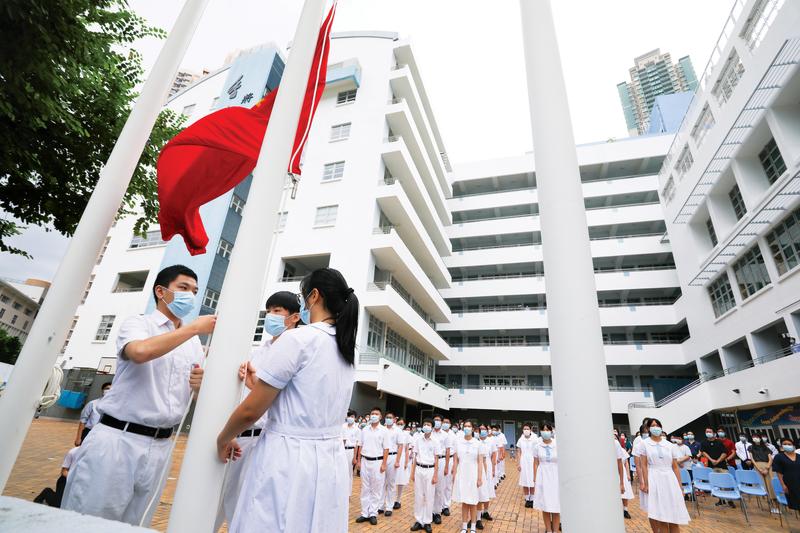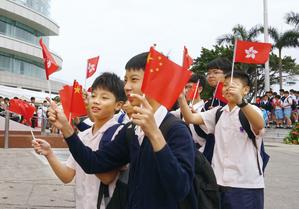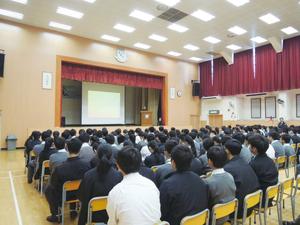Hong Kong educators have joined in the clarion call for national education to be included in local schools’ curriculum to nurture a greater sense of belonging and pride among young people. Eleanor Huang reports from Hong Kong.
 (PHOTO PROVIDED TO CHINA DAILY)
(PHOTO PROVIDED TO CHINA DAILY)
A year after Hong Kong was gripped by an unprecedented wave of social unrest often laced with clamoring for Hong Kong independence, local education experts are at pains to stress that schools ought to play a more assertive role in fostering national education.
National education is an organic part of education worldwide, they say, and it is perfectly normal for it to be part of schools’ curriculum to nurture a sense of belonging among young people as they embark on a journey of self-discovery and self-realization.
First, I learned my dad’s last name as Ngai, then my mom’s surname as Lam. Then, I know I’m from Hong Kong and my motherland is China. ... They’re all part of who we are
George Ngai Siu-keung, senior lecturer at the Education University of Hong Kong
An attempt by the Hong Kong government to introduce moral and national education in primary and secondary schools in 2012 was thwarted by protests that branded the proposed curriculum as “brainwashing”.
Joining in the clarion call, George Ngai Siu-keung — a senior lecturer at the Department of Education Policy and Leadership at the Education University of Hong Kong — described national education as simply a “natural” socialization process, whereby an individual develops a personal identity and learns the norms — values, behavior and skills — in society.
Such a process prevails around the world, he said. “If you were born in the United States, your family and teachers teach you American English, and if you were born in Haiti, they teach you French. It’s perfectly normal.”
National education is as natural as learning about one’s family history, Ngai said. “First, I learned my dad’s last name as Ngai, then my mom’s surname as Lam. Then, I know I’m from Hong Kong and my motherland is China. We all have to know our roots to know ourselves — they’re all part of who we are.”
Without it, young people would lose their sense of oneself in this vast world and, more importantly, those impressionable youths could easily be negatively influenced after being bombarded with biased news about the Chinese mainland from an early age.
 Students wave national and Hong Kong regional flags at Golden Bauhinia Square. (PHOTO PROVIDED TO CHINA DAILY)
Students wave national and Hong Kong regional flags at Golden Bauhinia Square. (PHOTO PROVIDED TO CHINA DAILY)
Ngai chastised young people who desecrated or burned the national flag during last year’s anti-government protests, calling their behavior “heart-wrenching”.
“You wouldn’t stomp on other countries’ national flags. How and why would you do such a thing to your own country?” he asked. “Why are you not respecting your fellow 1.4 billion compatriots who share a similar cultural background?”
Ngai, who’s also a manager of Fanling Rhenish Church Secondary School, stressed that national education is essential for students to embrace their heritage, take pride in who they are, let their virtues shine and live a meaningful life.
“If you don’t even love your home or your own country, how can you ever love others and the world? Without loving your own self, you’re only living in a hotbed of hate,” he said.
Ngai’s pedagogic beliefs are shared by Hui Chun-lung, principal of HKFEW Wong Cho Bau Secondary School.
Hui said now is a good time to add national education to schools’ curriculum to help students systematically learn about and be proud of their Chinese identity.
In the past two decades, he said, the balance has tilted too much toward “two systems” in the governing principle of “one country, two systems”. With the National Security Law now in force, it’s high time the imbalance in the curriculum be addressed, he said.
“We seldom talk about our national identity as Chinese. Most of the textbooks only mention we’re Hong Kong residents,” Hui said, adding that this is why some young people don’t agree they belong to the Chinese population, which is wrong.
The fact that the bulk of Hong Kong residents have their roots on the mainland is evident in history, he said, proposing a national education curriculum that teaches history, Chinese culture and modern China.
Such a holistic understanding of the country should start at a young age, as such values are essential for a child’s upbringing, Hui said.
Students’ understanding of their country should progress as they advance through kindergarten, primary and secondary school and college, during which they would gain a better knowledge of their identities and the contributions they can make to their community and country, he added.
 tudents at Fanling Government Secondary School hear a speech given by a national legislator. (PHOTO PROVIDED TO CHINA DAILY)
tudents at Fanling Government Secondary School hear a speech given by a national legislator. (PHOTO PROVIDED TO CHINA DAILY)
Global practices
In this regard, Hong Kong can take a leaf from Macao, which is also governed under the “one country, two systems” principle.
Moral and civic education is taught in Macao — from primary through secondary school. The textbooks are compiled by the People’s Education Press, which publishes textbooks for mainland schools, at the request of the Macao Education and Youth Affairs Bureau in 2008. The topics include the Constitution and the Basic Law.
According to national political adviser Ho Teng-iat, flag-raising ceremonies are a regular event at Macao’s 87 primary schools and colleges.
Then-Japanese prime minister Shinzo Abe did not shy from advancing national education when he took office in 2006. His administration soon revised the country’s Basic Act on Education to highlight the objective of “fostering the value of respect for tradition and culture and love of the country and regions”.
Abe went further during his second term when his administration distributed workbooks on the awareness of Japanese identity and Japanese traditions in schools to address “extreme individualism and loosening social ties” among young people.
Japanese primary schools introduced a subject on moral and national education in April 2018, and junior high schools followed suit a year later with textbooks vetted by the government, as is the requirement for all textbooks.
Singapore introduced a similar curriculum in schools in 1997 to “build national cohesion” and “cultivate students’ confidence in our future”. Then-prime minister Goh Chok Tong said Singaporean youths lacked proper knowledge of their country, particularly its modern history, and national education was deemed vital to remedy the situation.
The initiative covers four aspects — fostering a sense of identity, pride and self-respect among young people as Singaporeans; getting them to know the Singapore story; getting them to know Singapore’s unique challenges, constraints and vulnerabilities; and instilling in young people the core values of the way of life and the will to prevail that would ensure their continued success and well-being.
In the United States, the antithesis cited by critics of Hong Kong’s push for national education, the importance of respecting the national flag and anthem, as well as loyalty to the nation, is taught in the classroom.
Hong Kong’s urgent task
Ho Hon-kuen, principal of the Centre of National History Education (Hong Kong), said the city faces the urgent task of bringing students exposed to toxic separatism back on track, which he called a pressing educational matter.
Among the 10,022 people arrested in connection with violent protests between June 9, 2019 and Sept 15 this year, 1,729 were below the age of 18, while 3,927 were students. A 13-year-old girl received a 12-month probation order for burning the national flag “out of impulse”.
Such a worrying situation attests to the importance of introducing national education, said Lawrence Tang Fei, principal of Heung To Secondary School (Tseung Kwan O). Radical forces will penetrate schools and feed youths with poisonous ideology if the city doesn’t buttress its education system, he said.
Tang suggested that national education be taught using a structured curriculum instead of having its contents scattered throughout different classes.
Currently, subjects such as liberal studies, Chinese history and literature cover certain issues that touch on national education, but “100 schools have 100 teaching materials”, he said.
National education is a very crucial subject that should not be taught coincidentally with other subjects, Tang said. “The teachers don’t necessarily have a deep understanding of modern China. This is why some students have failed to form an objective and accurate idea of contemporary China.”
Ngai rejected suggestions that the local education system focus on making “global citizens” and that national education amounts to “retrogression”.
The long-time educator argued that national education provides a route for people to find their roots instead of “reviving nationalism” because only by truly loving and respecting their true identity can they love and respect people of different backgrounds. “Appreciating your nation does not contradict becoming a global citizen,” he said.
Ngai agreed with the views of Chinese Confucian philosopher Mencius, who famously said: “Honor old people as we do our own aged parents, and care for others’ children as one’s own.”
Loving one’s own identity is prerequisite for the growth of everything else, Ngai said.
Contact the writer at eleanorhuang@chinadailyhk.com


